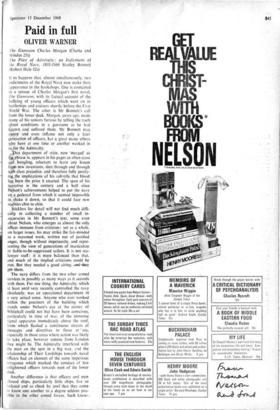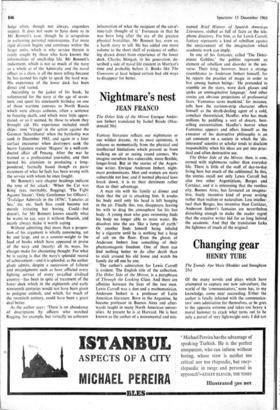Paid in full
OLIVER WARNER
The Price of Admiralty : an Indictment of the Royal Navy, 1805-1966 Stanley Bonnett (Robert Bale 42s) It So happens that, almost simultaneously, two indictments of the Royal Navy now make their appearance in the bookshops. One is contained in a reissue of Charles Morgan's first novel, The Gunroom, with its factual account of the bullying_ of young officers which went on in battleships and cruisers shortly before the First World War. The other is Mr Bonnett's call from the lower deck. Morgan, years ago, made many of his seniors furious by telling the truth aloopt conditions in a gunroom as he had
knpwn and suffered them. Mr Bonnett may annoy and even inflame not only a later generation of officers, but a great many others- who. have at one time or another worked in o4or the Admiralty.
ojhat _department of state, now 'merged' as 1çjp1rasc is, appears in his pages as often crass 4nd bungling, reluctant to learn any lesson frilin new inventions, Shot through and through th class prejudice, and therefore fully justify- ing,the implications of his sub'-title that blood kg been the price it exacted. The span of his narrative is the century and a half since Nelson's achievements helped to put the navy onha ,pedestal from which it seemed impossible to.,shake it down, so that it could face new realities chin to chin.
Sticklers for detail will not find much diffi- c,ully in collecting a number of small in- assuracies in Mr Bonnett's text, some even about Nelson, who emerges as almost the only officer immune from criticism: yet as a whole, on larger issues, his may strike the fair-minded
E as a reasoned work, written out of justified anger, though without impetuosity, and repre- senting the -view of generations of inarticulate or liable-to-be-suppressed sailors. It is not sea- lawyer stuff: it is mqre balanced than that, and much of the implied criticisms could be met, -But they needed a good airing, .and-'they 01, them.
The navy differs from the two other armed services in possibly as many ways as it accords with them. For one thing, the Admiralty, which at least until very recently controlled the navy absolutely, was an operational department id' a very actual sense. Anyone who ever worked within -the precincts of the building which stands under Nelson's eye at the corner of Whitehall could not but have been conscious, particularly in time of war, of the immense signal apparatus immediately above the roof, from --which flashed a continuous stream of messages and directives to those at' sea, especially in those areas where action was likely to take place, however remote from London they might be. The Admiralty interfered with the man on the spot in a big way, and the relationship of Their Lordships towards naval officers had an element of the same imperious arrogance which marked the conduct of less enlightened officers towards men of the lower deck.
Another difference is that officers and men aboard ships, particularly little ships, live so isolated and so cheek by jowl that they come to know one another to a degree seldom pos- able in the other armed forces. Such know-.
ledge often, though not always, engenders respect. It does not seem to have done so in Mr Bonnett's case, though he is scrupulous in eschewing personal reminiscence. Far more rigid division begins and continues within the larger units, which is why service therein is rarely sought by those who have known the informalities of small-ship life. Mr Bonnett's indictment, which is not so much of the navy as a whole as of the Admiralty and the naval officer as a class, is all the more telling because he has earned his right to speak the hard way. His experience of the lower deck has been direct and varied.
According to the jacket of his book, he volunteered for the navy at the age of seven- teen, and spent his nineteenth birthday on one of those wartime convoys to North 'Russia which were always arduous, often a sentence to freezing death, and which were little appre- ciated, or so it seemed, by those to Whom they brought aid. His experience included small ships: HMS 'Virago' in the action against the German `Schanthorst' when the battleship was sunk in December 1943, and again in a later surface encounter when destroyers sank the heavy Japanese cruiser 'Haguro' in a well-con- ducted affair off Penang. After the war he trained as a professional journalist, and then turned his attention to producing a long- - pondered, factually based thongh ex pane statement of what he feels has been wrong with the service with whom he once fought.
Mr Bonnett's very chapter headings indicate the tone of his attack : 'When the Cat was King' (yes, inevitably, flogging); 'The Fight Against Steam'; 'Only Gentlemen for Officers'; 'Trafalgar Admirals in the 1870s'; 'Lunatics at Sea,' etc, etc. Such bias could become not
• merely irritating but boring. Could—but doesn't, for Mr Bonnett knows exactly what he wants to.say, says it without flourish, and nearly always make it worth saying.
Without admitting that more than a propor- tion of his argument is wholly convincing, yet by and large, and as a counter-weight to the load of books which have appeared in praise of the navy and (nearly) all its ways, his charges make for chastening thought. For what he is saying is that the navy's splendid record of achievement—and it is splendid, as the author glady admits, despite a succession of failures and misjudgments such as have afflicted every fighting service of every so-called civilised country—has been in spite of treatment of the lower deck which in the eighteenth and early nineteenth centuries would not have been given to pedigree animals, and which, for much of the twentieth century, could have been a great deal better.
As the author says: 'There is an abundance of descriptions by officers who watched flogging, for example, but virtually no coherent
information of what the recipient of the cat-o'- nine-tails thought of it.' Fortunate in that he was born long after the era of the greatest physical brutalities, Mr Bonnett has, even so, a harsh story to tell. He has added one more volume to the short shelf of evidence of suffer- ing drawn direct from experience of the lower deck. Charles Morgan, in his generation, de- scribed a side of naval life existent in Marryat's time and probably before it. Books like The Gunroom at least helped certain bad old ways to disappear for better.















































 Previous page
Previous page